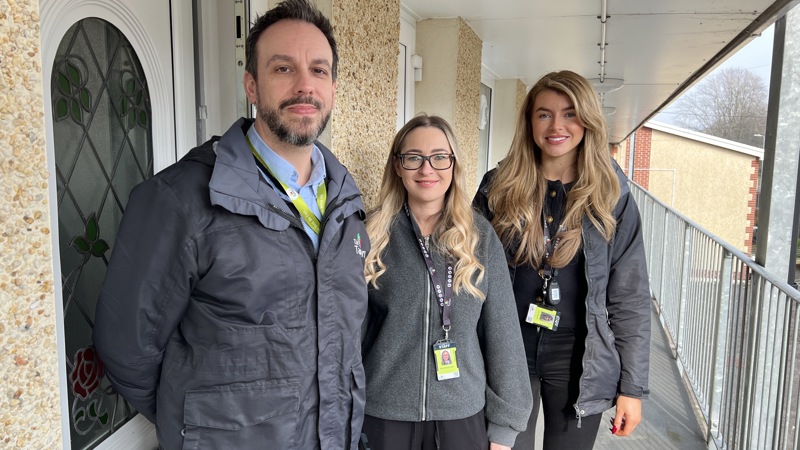Meet our housing officers
Wednesday 07 May 2025

One of the most regular staff contacts you have with us is likely to be with your housing officer. These are the people to go to for any tenancy related queries and are on hand to support you in your home.
A 23-strong team, we caught up with three of them, Rachel, Lilly and Paul to find out a bit more about their role:
Paul starts our conversation by telling us a bit about the job:
“In essence, it’s about us ensuring that the tenant can sustain their tenancy, through building strong relationships with them and making sure they feel supported.
“There are lots of different aspects to this, including making sure they have any extra support they need, the property is suitable for their needs, they are able to make their rent payments and that their home remains in a good condition.”
Rachel continues:
“Each housing officer has around 500 properties on their patch, so it can be difficult to make regular contact with each one, but we are happy to visit any customer, if they get in touch.
“However, we do have a system in place whereby if we haven’t had contact from someone in a while, we will arrange to visit, just to make sure that they are okay and to see if they need any help or support from us. If they do need any extra help then we can make more regular visits or refer them on to our specialist teams within Tai Tarian or to one of the external agencies that we work with.”
For Lilly, it’s the diversity of the job that appeals to her:
“I love the variety of what we do. It could be anything from making sure a tenant has settled into their new home, meeting tenants on our estate walkabouts or dealing with challenges such as anti-social behaviour. We also have to maintain the health and safety of blocks of flats by ensuring communal areas are kept clear of potential fire hazards, ensuring the bins and recycling facilities are being used properly and reporting any instances of fly tipping.
“It’s a bit of a cliché, but no two days are the same. We may have our day planned out, but then the phone rings or a situation arises, and we need to change our plans. We have to be flexible and react to changing situations.”
Although the housing officers are often out and about in the community, they are never alone, as Paul explains:
“We have great support from our managers, who are always there to advise and help us with anything.
“We also have great connections with lots of partners who we can refer tenants on to if they need extra help with things such as their mental health, financial wellbeing or independent living.
“We have strong relationships with local police and often partner each other on estate walkabouts, where we can identify any issues early and hopefully deal with them before they get out of hand. We also work with social services if we spot any potential safeguarding concerns.”
One of the major issues the team deal with is anti-social behaviour (ASB), and this is something Rachel says takes up a lot of their time:
“It is a big issue, and we do get complaints. It can cause a lot of stress in a community, whether that’s loud music, late-night parties, people having a disregard for our tenants or neighbour disputes.
“We realise how stressful it can be for victims and that they may be fearful of what might happen if they report ASB, but the only way we can deal with it is if they come forward with the information we need in order to investigate and take any necessary action. We take every report seriously and do look into every accusation.”
“We always try and resolve issues amicably,” adds Lilly. “Sometimes it can be as simple as having a quick word with the neighbour who was unaware their music was on so loud and was having an impact on others, but in more serious cases we have to take more robust action.
“In extreme cases, where there’s no chance of finding a peaceful resolution, we will consider enforcement actions, by way of injunction or making a possession order. This is always a last resort, and we will exhaust all other options and remedies available to us first, to try and resolve the issue, but we will do it and have done it if the situation warrants it. ASB can have a detrimental impact on a whole street, so when the situation gets so bad, we will enter into a form of legal action to support the wider community. We have to consider the wellbeing of our tenants in our communities.”
Despite the challenges and sometimes the difficult situations they deal with, all three are in agreement that it’s a worthwhile job:
“It’s the little tasks that are the most rewarding for me,” says Lilly. “What might seem like a small thing for us can make a big difference to a tenant’s life, and that’s what I enjoy most about this job.”
Rachel agrees that helping tenants is the most satisfying part of the job:
“If you’re struggling to maintain your tenancy though health, financial or any other reason, then we can support you. I promise we won’t judge you and will do everything we can to find you the right support.”
The final word goes to Paul, who says:
“It’s the people you meet in our communities and the positive difference that we can make to people’s lives that really make this job so rewarding.”

